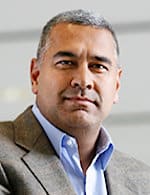
For startup and emerging financial-technology firms, there are various paths to success. Just jumping in and directly competing mano a mano with larger incumbents probably isn’t one of them.

Sunil Hirani, trueEx
Speaking today at the Sandler O’Neill Global Exchange and Brokerage Conference, founders of successful fintech firms indicated that when building a business, finesse trumps brute force.
trueEX is an electronic, CFTC-regulated exchange for interest-rate swaps that launched in 2010. A primary challenge upon opening its doors was that large, established players such as Bloomberg and Tradeweb operate in the same space.
The approach was “to do things they’re not necessarily focused on,” said trueEX Founder Sunil Hirani. “You don’t knock on the door and say to the incumbents, ‘please let me in’…it needs to be a flanking move.”
As larger rivals focused on USD swaps, trueEX moved into smaller markets such as Mexico, Scandinavia and Switzerland, Hirani said. This allowed the company to build relationships with banks and also connect with the buy side — both of which can be springboards to broader success.
Start-up firms fail not because of the competition, but because they run out of cash, noted Stu Taylor, co-founder and chief executive officer of Algomi. With this in mind, Algomi executives made the conscious decision to be a technology provider, rather than just a trading platform, when it was founded in 2012. This approach generated cash, which in turn led to venture-capital funding.

Stu Taylor, Algomi
More recently, Algomi has entered into partnerships with large, established companies such as exchange operator Euronext and investment manager AB. “It shows the industry that Algomi has a couple big brothers in the playground,” which boosts market perception that the company is here to stay, Taylor said.
Smaller companies are well-suited to effect change in markets, as trying to get big banks to change is a “slow and weary” process that can result in “arrows in your back,” Taylor said. A feature of Algomi’s ethos is “the grit to keep attacking a problem until its solved,” he added.
Earlier this year, eight-year-old Thesys Technologies won the high-profile business of building the SEC-mandated Consolidated Audit Trail, beating about 30 other bidders including a number of larger and more established technology providers.

Mike Beller, Thesys
Rather than competing on technology alone, Thesys took a “fresh approach” that put the company’s markets expertise front and center, according to Thesys Managing Partner Mike Beller. This expertise spans financial reporting, cyber security, regulation, and other areas pertinent to the CAT.
“We are at the nexus of technology and deep market knowledge,” Beller said. “That gave us a major advantage.”




